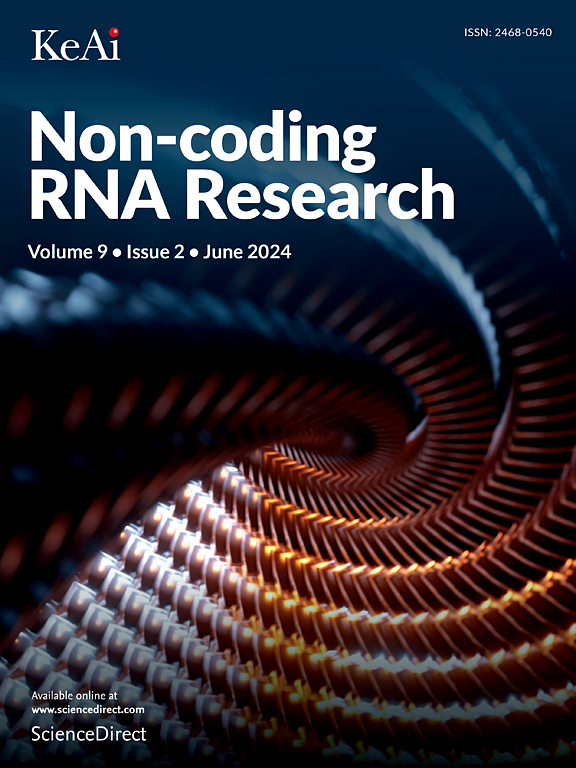Tongue squamous cell carcinoma-derived exosomes miR-21-5p affect tumor progression via promoting M2 macrophage polarization
IF 5.9
3区 生物学
Q1 BIOCHEMISTRY & MOLECULAR BIOLOGY
引用次数: 0
Abstract
Exosome-mediated intercellular communication plays a key role in shaping the tumor microenvironment and promoting tumor progression. Recent studies have demonstrated that tumor exosomal miRNAs significantly contribute to the polarization of tumor-associated macrophages (TAMs). However, the molecular mechanisms underlying miRNA-mediated regulation of macrophage polarization by exosomes derived from tongue squamous cell carcinoma (TSCC) remain incompletely elucidated. In this study, small RNA sequencing analysis of exosomal miRNAs revealed miR-21-5p was highly expressed in TSCC-derived exosomes. Further investigation demonstrated a significant association between exosomal miR-21-5p and M2 polarization of tumor-associated macrophages (TAMs). Functionally, TSCC-derived exosomes promoted the polarization of M0 macrophages towards the M2 phenotype. Mechanistically, exosomal miR-21-5p enhanced M2 polarization of TAMs by inhibiting phosphorylation of ERK1/2. Additionally, we performed single-sample gene set enrichment analysis (ssGSEA), constructed a multivariate Cox regression model, and performed survival analysis using paired RNA transcriptome and clinical data from TSCC patients. Our results revealed a significant enrichment of M2 macrophages in the tumor microenvironment (TME) of TSCC compared to adjacent normal tissue. Furthermore, we confirmed that M2 macrophages infiltration is associated with poor prognosis in TSCC patients. In summary, our study demonstrates that TSCC-derived exosomal miR-21-5p plays an critical role in M2 macrophage polarization, and M2 macrophages infiltration contributes to the progression of TSCC. Therefore, these findings suggest that therapeutic targeting of miR-21-5p may represent a novel strategy for TSCC treatment by selectively modulating the M2 polarization of TAMs.
舌鳞癌源性外泌体miR-21-5p通过促进M2巨噬细胞极化影响肿瘤进展
外泌体介导的细胞间通讯在塑造肿瘤微环境和促进肿瘤进展中起着关键作用。最近的研究表明,肿瘤外泌体mirna显著促进肿瘤相关巨噬细胞(tam)的极化。然而,来自舌鳞状细胞癌(TSCC)的外泌体通过mirna介导巨噬细胞极化调节的分子机制尚未完全阐明。在这项研究中,外泌体miRNAs的小RNA测序分析显示,miR-21-5p在tscc衍生的外泌体中高度表达。进一步的研究表明,外泌体miR-21-5p与肿瘤相关巨噬细胞(tam)的M2极化之间存在显著关联。功能上,tscc衍生的外泌体促进M0巨噬细胞向M2表型极化。机制上,外泌体miR-21-5p通过抑制ERK1/2的磷酸化来增强tam的M2极化。此外,我们进行了单样本基因集富集分析(ssGSEA),构建了多变量Cox回归模型,并使用配对RNA转录组和TSCC患者的临床数据进行了生存分析。我们的研究结果显示,与邻近正常组织相比,TSCC肿瘤微环境(TME)中M2巨噬细胞显著富集。此外,我们证实M2巨噬细胞浸润与TSCC患者预后不良有关。综上所述,我们的研究表明,TSCC来源的外泌体miR-21-5p在M2巨噬细胞极化中起关键作用,M2巨噬细胞浸润有助于TSCC的进展。因此,这些发现表明,靶向治疗miR-21-5p可能是一种通过选择性调节tam的M2极化来治疗TSCC的新策略。
本文章由计算机程序翻译,如有差异,请以英文原文为准。
求助全文
约1分钟内获得全文
求助全文
来源期刊

Non-coding RNA Research
Medicine-Biochemistry (medical)
CiteScore
7.70
自引率
6.00%
发文量
39
审稿时长
49 days
期刊介绍:
Non-coding RNA Research aims to publish high quality research and review articles on the mechanistic role of non-coding RNAs in all human diseases. This interdisciplinary journal will welcome research dealing with all aspects of non-coding RNAs-their biogenesis, regulation and role in disease progression. The focus of this journal will be to publish translational studies as well as well-designed basic studies with translational and clinical implications. The non-coding RNAs of particular interest will be microRNAs (miRNAs), small interfering RNAs (siRNAs), small nucleolar RNAs (snoRNAs), U-RNAs/small nuclear RNAs (snRNAs), exosomal/extracellular RNAs (exRNAs), Piwi-interacting RNAs (piRNAs) and long non-coding RNAs. Topics of interest will include, but not limited to: -Regulation of non-coding RNAs -Targets and regulatory functions of non-coding RNAs -Epigenetics and non-coding RNAs -Biological functions of non-coding RNAs -Non-coding RNAs as biomarkers -Non-coding RNA-based therapeutics -Prognostic value of non-coding RNAs -Pharmacological studies involving non-coding RNAs -Population based and epidemiological studies -Gene expression / proteomics / computational / pathway analysis-based studies on non-coding RNAs with functional validation -Novel strategies to manipulate non-coding RNAs expression and function -Clinical studies on evaluation of non-coding RNAs The journal will strive to disseminate cutting edge research, showcasing the ever-evolving importance of non-coding RNAs in modern day research and medicine.
 求助内容:
求助内容: 应助结果提醒方式:
应助结果提醒方式:


